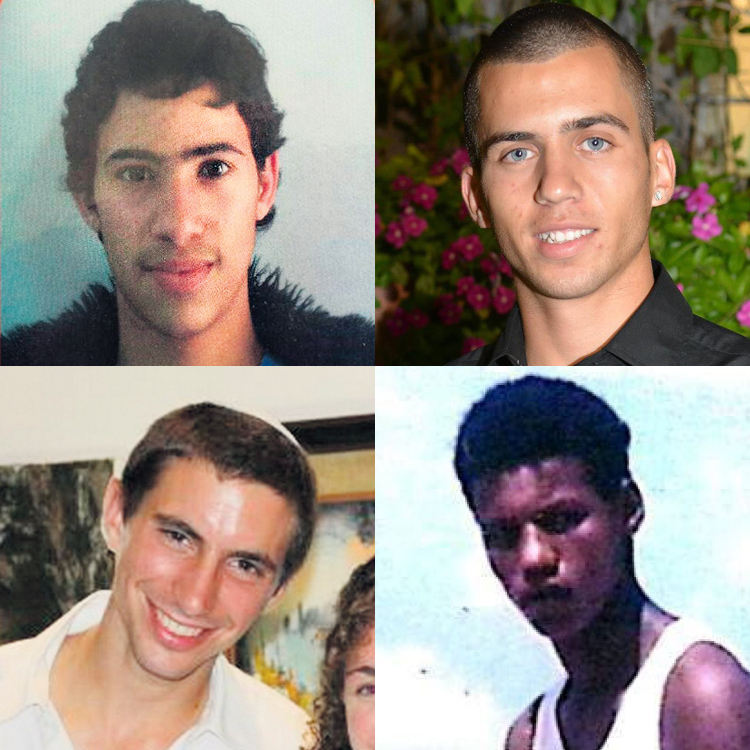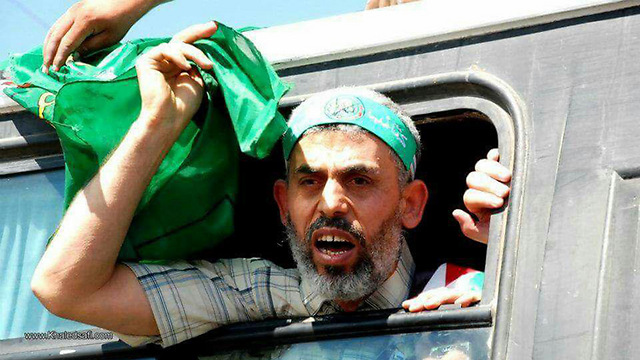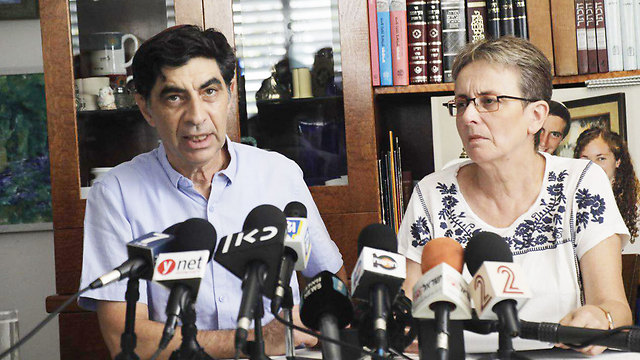
Israeli gov't 'interested in the stability of Hamas rule in Gaza'
In the wake of resignation of PMO's coordinator for POWs and MIAs and harsh criticism from Shaul and Goldin families, senior official clarifies Israel is not putting more economic pressure on the Gaza Strip because it 'is interested in the stability of the Hamas rule in Gaza, as the alternative is far worse.'
Negotiations between Israel and Hamas on the return of three Israeli citizens and the bodies of two IDF soldiers have been defined by high rank intelligence officials as "really stuck" and a "non-starter."
The bleak assessment comes following the recent resignation of Col. (res.) Lior Lotan, the coordinator for POWs and MIAs in the Prime Minister's Office, and the harsh criticism from the families of the two soldiers against Defense Minister Avigdor Lieberman, who they dubbed as a "coward" and "weak."
Over the last year, efforts have been made to clarify the situation of the POWs and MIAs being held by Hamas in Gaza.
Israel's intelligence community determined with high certainty that Hamas is holding two Israeli citizens: Abera Mengistu, 30, from Ashkelon, who has been in the strip since September 2014, and Hisham Shaaban al-Sayed, a Bedouin man from Hura, who crossed into Gaza in April 2015. Both are alive but suffering from physical and mental problems and need to be on medication on a regular basis. Israel has tried, with an unknown measure of success, to transfer the medications they need through several different intermediaries and channels.
In addition, Hamas is holding the bodies of IDF soldiers Lt. Hadar Goldin and Sgt. Oron Shaul, who were declared dead based on forensic, medical and intelligence assessments, as well as Jewish law.
Hamas is also holding an additional Israeli citizen, Jumaa Ibrahim Abu-Ghanima, whose presence in Gaza is defined as a "security affair" by the intelligence community, and he is not included on the list of POWs and MIAs. There is also doubt as to whether he really wants to return to Israel.
The negotiations with Israel are being led by two Hamas officials: Hamas leader in the Gaza Strip Yahya Sinwar and his aide Jihad Yaghmur, who were both released as part of the 2011 Shalit deal. Both were sent to prison, among other things, for planning the kidnapping of IDF soldier Nachshon Wachsman. In a cruel twist of fate, it was during Wachsman's failed rescue attempt in 1994 that the same Lior Lotan was seriously wounded. He was awarded a military citation for his actions in that mission.
When they were released from prison, the two promised the prisoners left behind that they would not abandon them. Sinwar sees it as his duty to keep that promise.
Following what Hamas and the Palestinian public view as the great success of the Shalit deal—which saw the release of 1,027 Palestinian imprisoned in Israel for terror offenses, some of them very severe, in return for one soldier—it is considered the starting point for any future deal. To make that clear, Hamas conditioned merely information on the fate of the POWs and MIAs with the release of the Shalit deal prisoners who have been arrested again since.
Hamas has already given Israel—through intermediaries—its main conditions for a full deal, and they are more or less similar to the Shalit deal as far as the numbers go: The release of some 1,000 living prisoners, as well as the return of bodies and other terms.
Israel unequivocally rejected these conditions. "There's nothing to talk about," said the Israeli negotiation team, led by Lotan, after taking the Hamas terms to the prime minister, defense minister, and Security Cabinet.
"Israel of today is not the same Israel that existed on the eve of the (October 2011) Shalit deal," explained a senior Israeli official. "Primarily, because the deal that was signed had already carried with it strong criticism from the public. Secondly, because living citizens who were taken by Hamas, partially due to their own fault, are not considered by the public to be soldiers who were taken captive while defending the country. This is why the public is only willing to pay a lower price for them. Third, because in light of the Shamgar Commission's conclusions on the price that should be paid for POWs and MIAs, there are those in the political ranks, the intelligence and military ranks, and among the public, who want to exchange bodies for bodies rather than pay the price of living prisoners, certainly not prisoners with blood on their hands."
Col. (res.) Lotan realized that in the current state of affairs, there is no chance of reaching a deal, and after three difficult and exhausting years doing the job voluntarily, he decided to resign his post.
The families demand taking other measures against Hamas, such as military operations to release the bodies and the captives, or economic and internal pressure on the Gaza terror group.
It is safe to assume the defense establishment would not rush to any military operation to release the citizens and return the bodies of the soldiers that could risk soldiers' lives.
As for economic pressure in the form of a complete and air-tight closure of the strip, preventing the transfer of merchandise, equipment, food etc. inside, the senior Israeli official noted it was "Undesirable to impose a boycott similar to what the Defense Ministry put on Gaza in order to pressure Hamas to release Shalit. Primarily, because it didn't work last time either. We didn't get Shalit despite all of the steps we took, including the arrest of Hamas leaders, more bombardments, or imposing a stricter blockade on Gaza. Second, the humanitarian crisis in Gaza is so severe and the population's situation is so bad that any change could lead to an explosion, the collapse of the Hamas rule, chaos and war against Israel."
"In fact," the official concluded. "Israel is interested in the stability of the Hamas rule in Gaza, because the alternative is far worse. This is why there isn't a more intense pressure put to return the captives and soldiers' bodies."
Ronen Bergman, a senior correspondent for military and intelligence affairs at Yedioth Ahronoth and a contributing writer for The New York Times Magazine and, is the author of the forthcoming “Rise and Kill First: The Secret History of Israel’s Targeted Assassinations.”













